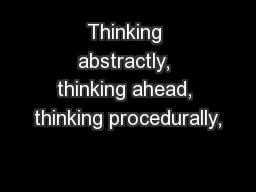PPT-Ten Commandments of scientific thinking in psychology
Author : conchita-marotz | Published Date : 2017-11-09
Week 15 Ten Commandments of UN s cientific thinking in psychology Week 15 Deepak Chopra In your online questionnaire Week 2 you judged a series of statements whether
Presentation Embed Code
Download Presentation
Download Presentation The PPT/PDF document "Ten Commandments of scientific thinking ..." is the property of its rightful owner. Permission is granted to download and print the materials on this website for personal, non-commercial use only, and to display it on your personal computer provided you do not modify the materials and that you retain all copyright notices contained in the materials. By downloading content from our website, you accept the terms of this agreement.
Ten Commandments of scientific thinking in psychology: Transcript
Download Rules Of Document
"Ten Commandments of scientific thinking in psychology"The content belongs to its owner. You may download and print it for personal use, without modification, and keep all copyright notices. By downloading, you agree to these terms.
Related Documents














